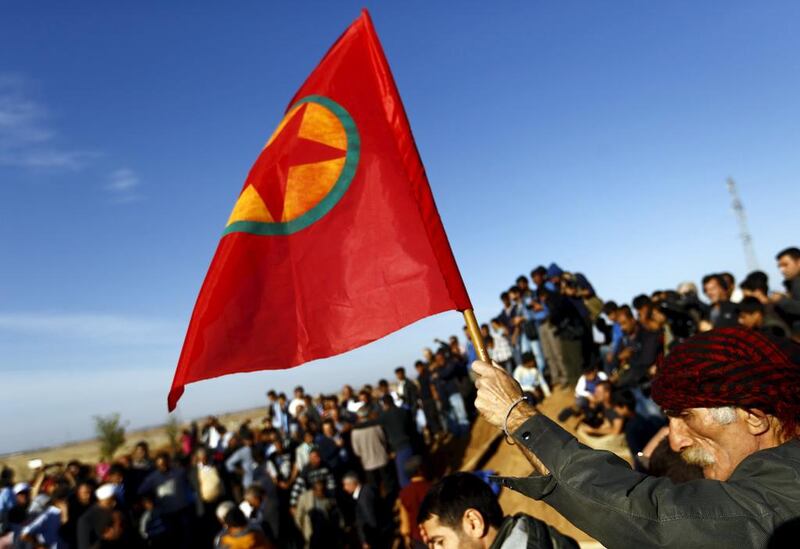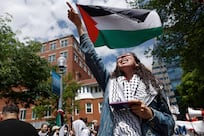The Syrian Kurdish Democratic Union Party, or PYD, made history last week when it announced a federal system in northern Syria. The declaration is both symbolic and catalytic, and there are reasons to believe it is not as foolhardy as many think. Although Syrian and Iraqi Kurds differ on many issues, the move has linked the adjoining territories controlled by Kurds, who prevail over a combined territory the size of Sri Lanka.
In Syria, the PYD controls approximately 10,000 square miles, roughly two-thirds of the territory ruled by Iraqi Kurds. In October, the party seized more territory after gains against ISIL in northern Syria. Since then, the group’s military wing, the YPG, drove out ISIL from southern Hasaka. This has galvanised Kurdish activists who dream of statehood for “the world’s largest stateless nation”.
On the other hand, the news agitated almost everyone else involved in the conflict in Syria, including putative Kurdish allies such as Haitham Mannaa, a Syrian opposition figure who has distanced himself from mainstream rebels. The US too stated it would not recognise the federacy. Turkey, unsurprisingly, rejected it.
Local populations in northeastern Syria also fear the YPG’s nationalist project, particularly after incidents, documented by Amnesty International, of home demolition and forced displacement by the Kurdish militia against Arab families.
From the outside, the project appears to be a fool’s errand. In Iraq, Kurds carved out a semi-autonomous region after the US-led coalition forces declared a safe haven inside Iraq in 1991. In Syria, the Kurds are outnumbered and surrounded by hostile Arab demographics and armed groups, not to mention Turkey. Kurdish-majority areas are also scattered throughout northern Syria.
The move, many say, was premature. The Kurds could have continued to stiffen their dominance in northeastern Syria through military battles against ISIL and the existing system of provisional cantons. Also, the announcement followed the YPG’s “back-stabbing” of Syrian rebels when it attacked them as they were being pounded by Russia and the regime in northern Aleppo last month.
But apparent risks may well be outweighed by opportunities. The PYD has time to build facts on the ground and pioneer a future federal Syria.
The Kurds have established themselves as a bulwark against ISIL in Syria. Washington, the PYD’s military supporter, understands that if the Kurds are weakened, ISIL will be strengthened. In the absence of an effective replacement, the US is unlikely to cease support for the PYD. Turkey appears to be more prepared to mobilise forces against the Kurds, who fight ISIL, than to back an effective army to both balance the YPG and fight ISIL.
The PYD has the advantage of keeping the US on its side as long as there is an ISIL threat. That means the PYD can continue to entrench itself in those areas, the only place where the regime of Bashar Al Assad cannot bomb.
The Syrian rebels are unlikely to unite against the PYD. Tensions between nationalist forces and Jabhat Al Nusra have dominated the rebel landscape in recent weeks, and the rebels do not have the capacity to operate against the Kurds, ISIL and the regime at the same time. The conflict in Syria still rages, and the rebels will continue to focus on the regime for now.
The PYD also has allies within Arab tribes in northeastern Syria and, depending on how the organisation will rule the areas in coming months, support for the idea might increase. Hemaydi Al Dham, from the powerful Shammah tribal confederation, is the main ally of the PYD, leading a tribal militia working under the Kurdish-dominated and US-backed Syrian Democratic Forces. While many in Hasakah have profound tensions with the Kurds, some see their interests with the up-and-coming PYD. Some even cite historical alliances with the Kurds against fellow Arab tribes.
The Kurds have the time to win over the sizeable Arab constituency. This is achievable if one considers that Hasakah and Raqqa, relative to other provinces, had weak armed insurgency during the conflict and its residents were largely disarmed by ISIL when it controlled their areas. Areas captured by the regime also tend to have little ability or organisation to rise up against their new rulers.
For all those reasons, the PYD’s announcement does not sound so fanciful. Even if it faces an organised effort to dismantle its project, the end-game scenario will be a power-sharing deal that salvages at least some of the Kurds’ gains. Short of pressure by the US and Turkey, only organised rebellion against the PYD or a defeat of the Kurdish militias can kill the idea.
For the time being, neither scenario is likely. Eventually, Syrians may realise the merits of a system already practised by the Kurds.
Hassan Hassan is a resident fellow at the Tahrir Institute for Middle East Policy and co-author of ISIS: Inside the Army of Terror
On Twitter: @hxhassan





